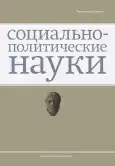Astronomy and astrology: opposition or reflection?
- Authors: Liutaeva M.S.1
-
Affiliations:
- Vladimdir State University named after Alexander and Nikolay Stoletovs
- Issue: Vol 13, No 2 (2023)
- Pages: 113-118
- Section: Social and Political Philosophy
- URL: https://journal-vniispk.ru/2223-0092/article/view/145529
- ID: 145529
Cite item
Abstract
The article examines the dynamics of change and differentiation of the semantics of the lexemes “astronomy” and “astrology” in the Russian context. The relevance of the study is associated with the wide prevalence of anti-scientist phenomena among the population and the difficulty of orienting scientific discoveries and pseudoscientific statements in the information sphere. The distinction between astronomy and astrology can serve as a “classic” illustrative example of the formation of boundaries and criteria of science, previously formulated in the philosophy of positivism. Based on the textual material presented in the National Corpus of the Russian Language, the analysis of the process of differentiation of astronomy as an academic discipline, the scope of mathematical and natural scientific methods and astrology as a pseudoscience is carried out. On the one hand, astrology imitates the structure and form of scientific knowledge, acts as a critique of positively oriented knowledge based on quantitative data and ignoring the sphere of the irrational, spiritual, individually significant. On the other hand, in the context of the historical memory of the scientific system, astrology has a communicative significance and reflexive value, being one of the topics of discussion in numerous discussions about “falsities”.
Full Text
##article.viewOnOriginalSite##About the authors
Maria S. Liutaeva
Vladimdir State University named after Alexander and Nikolay Stoletovs
Author for correspondence.
Email: liutaeva@yandex.ru
ORCID iD: 0000-0002-9972-6674
Candidate of Philosophy; senior lecturer at the Department of Philosophy and Religious Studies of the Vladimdir State University named after Alexander and Nikolay Stoletovs. Vladimdir, Russian Federation.
Russian Federation, VladimdirReferences
- Antonovskiy A.Yu. Science as a social subsystem. Niklas Luhmann about mechanisms of social evolution of knowledge and truth. Voprosy filosofii. 2017. Vol. 7. Pp. 158–171. (In Rus.)
- Ardashev R.G. Astrology in the life of Russians: Features of consciousness. Sociology. 2020. No. 4. Pp. 101–105. (In Rus.)
- Berger P. The sacred canopy: Elements of a sociological theory of religion. Moscow: New Literary Review, 2019.
- Golubev Е.А., Utkina N.V. Modern concepts of identification of scientific knowledge. Modern European Researches. 2022. Vol. 1. Pp. 74–81. (In Rus.)
- Gordeeva I.V. Analysis of the reasons for changing attitudes towards science in the modern world. Actual Problems of the Humanities and Natural Sciences. 2014. No. 8 (1). (In Rus.) URL: https://cyberleninka.ru/article/n/analiz-prichin-izmeneniya-otnosheniya-k-nauke-v-sovremennom-mire/viewer (data of accesses: 16.03.2023).
- Ilyakhov M. Distinctly, clear: How to convey thoughts and convince people with the help of words. Moscow: Alpina Publisher, 2021.
- Comte O. Spirit of positive philosophy. Rostov-on-Don: Phoenix, 2003.
- Kun T., Ball O.A. The logic of discovery or the psychology of research? Philosophy of Science and Technology. 1997. Vol. 3. No. 1. Pp. 20–48. (In Rus.)
- Kunitsky R.V. Astronomy in atheistic propaganda. Earth and Universe. 1965. No. 1. Pp. 43–47. (In Rus.)
- Luhmann N. Truth, knowledge, science as a system. Moscow: Logos, 2016.
- Popper K. Logic and the growth of scientific knowledge. Moscow: Progress, 1983.
- Svetlikova I.Yu., Kalinovsky N.A., Fesenko M.O. The heavens and the laws. Astronomy and astrology and positivism in the late 19th – early 20th centuries. Philosophy. Journal of the Higher School of Economics. 2019. Vol. 3. No. 4. Pp. 90–112. (In Rus.)
- Smolkin V. A holy place is never empty: The history of Soviet atheism. Moscow: Moscow: NLO, 2018.
- Three examples from our press. Earth and Universe. 1989. No. 6. Pp. 39–43. (In Rus.)
- Shakhnovich M.M. The history of science in the anti-religious expositions of Leningrad in the 1920–1950s. In: Revolution and evolution: Models of development in science, culture, society: Proceedings of the III All-Russian Scientific Conference. A.M. Feigelman (ed.). Moscow: Publishing House “Russian Society for the History and Philosophy of Science”, 2021.
Supplementary files








